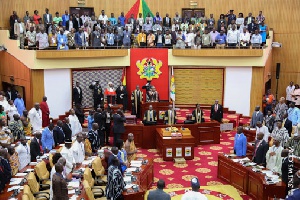Parliament’s approval of the Value Added Tax (VAT) exemptions on selected medicines would correspond to a thirty percent (30%) reduction on the NHIS tariffs on medicines and the private sector is also expected to make about thirty percent (30%) savings on the exemptions of VAT on the selected products, a Committee report on Subsidiary legislation has indicated.
According to a report of the Committee on Subsidiary legislation on the VAT (Exemption of Active Ingredients, Selected Inputs and Selected Drugs or pharmaceuticals) (Amendment) Regulations, 2017, the exemption covered 552 Active Pharmaceutical Inputs and excipients and 483 Imported finished Pharmaceutical products.
The report also states that the current exemption list is 352 Active Pharmaceutical Inputs and excipients and 118 Imported finished Pharmaceutical products. The list of Active Pharmaceutical ingredients includes packaging materials such as bottles, caps, drug information leaflet and other inputs.
The imported finished Pharmaceutical products include vaccine sera, immunoglobulins, medicines for HIV, TB, cancer as well as psychotropic.
The report also revealed that the annual reimbursement bill of the NHIA for medicine to service providers is about GH?800million.
Furthermore, the list of exemption of VAT on the selected products is to give leverage to the local manufacturers to make them competitive as part of efforts targeted at building the local industry.
Available records indicate that currently, 70% of medicines consumed in the country are imported whilst 30% are locally produced. The exemption would therefore give local manufacturers the space for expansion to be able to manufacture for both local consumption and export.
Chairman of the Committee, Mahama Ayariga stated that: “The exemption would reduce the cost of production which would consequently place more money in the hands of pharmaceutical companies.
This is expected to lead to the downward adjustments of prices of the selected pharmaceutical products. The overall objective is to enable the industry to expand and create more job opportunities for the unemployed,” he told Parliament when they approved the VAT exemptions on selected medicines.
Members of the Committee were also informed that the list of medicines to be exempted from VAT include most of the medicines on the list of drugs paid for by the NHIA.
Officials from Health Ministry also informed the Committee that, VAT constitutes about 40% of the total tax element on medicines in the country and this contributes to the high cost of medicines.
The exemptions are expected to support the drive of the Health Ministry to ensure that prices of medicines are contained in a manner that will sustain the Health Insurance and therefore reduce the amounts reimbursed by the Authority.
Click to view details



Business News of Sunday, 5 November 2017
Source: thebftonline.com
Parliament approves VAT exemptions on selected medicines
Entertainment
















